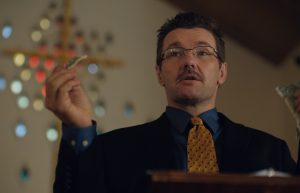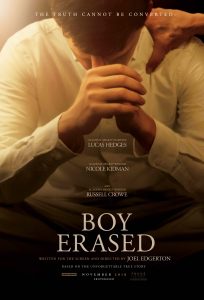‘Boy Erased’ inspires awakening to the truth
“Boy Erased” (2018). Cast: Lucas Hedges, Nicole Kidman, Russell Crowe, Joel Edgerton, Madelyn Cline, Victor McCay, David Joseph Craig, Troye Sivan, Jesse LaTourette, Théodore Pellerin, Flea, Joe Alwyn, Britton Sear, Cherry Jones, Xavier Dolan, Drew Scheid. Director: Joel Edgerton. Screenplay: Joel Edgerton. Book: Garrard Conley, Boy Erased. Web site. Trailer.
What are we to do when the reality of our self doesn’t match the image we hold – or that we believe we’re supposed to hold – of it? The frustration such circumstances engender can be maddening, perhaps threatening our prevailing worldview and causing us considerable anguish. That’s especially true when we’re pressured by others to conform to certain standards of behavior and outlooks on life that we know don’t suit who we truly are. So how do we reconcile such a conundrum? That’s what a troubled teen is forced to deal with in the new, fact-based drama, “Boy Erased.”
By all accounts, Jared Eamons (Lucas Hedges) is a fine, upstanding young man. As a star basketball player and an accomplished student getting ready to head off to college, Jared is the pride of his loving parents, Nancy (Nicole Kidman), a traditional homemaker, and Marshall (Russell Crowe), the owner of a car dealership and preacher at the local Baptist church. Outwardly, Jared lives up to all of the expectations placed upon him, embodying a model Christian youth who’s supposed to set a shining example for his peers. He loves his parents and his faith, and he seems ready to follow a traditional courtship path with his high school sweetheart, Chloe (Madelyn Cline). There’s just one problem – Jared suspects he’s gay, and it troubles him deeply, afraid that such “unnatural” feelings will disappoint his parents, his God and himself.

Troubled teen Jared Eamons (Lucas Hedges, left) confesses his concern that he might be gay to his Baptist fundamentalist parents, Marshall (Russell Crowe, center) and Nancy (Nicole Kidman, right), in director Joel Edgerton’s “Boy Erased.” Photo courtesy of Focus Features.
Jared tries desperately to squelch his thoughts for a long time, but, no matter how earnestly he does so, there’s no denying the persistence of such notions. Finally, while on a break home from college, he decides to confess his feelings to his parents, despite having never overtly acted on them. Needless to say, Nancy and Marshall are both quietly distressed, but, rather than fly into a tirade, mom and dad calmly and “rationally” seek to come up with a solution. And, after consultation with a pair of “learned” peers from the congregation, Marshall and Nancy offer a proposal to their son – enrollment in a church-sponsored “conversion therapy program” to help set him straight, literally (or so they believe).
Jared’s parents tell him that they still love him, despite his wayward “flaw.” However, they also make it plain that, if he hopes to remain under their roof and in their lives, he must comply with their wishes. They insist that he must rid himself of the “sin” that so blatantly and offensively goes against the tenets of their faith and that would almost assuredly cast aspersions on them by members of the congregation of their Arkansas parish. Should he refuse this, he would need to find new accommodations for himself and risk not seeing either of them again. So, to avoid such an unthinkable outcome, Jared agrees to their terms, expressing what appears to be a sincere desire to change and to return to the path that he has long known and from which he has strayed. He freely embarks on this journey, but it’s a sojourn that turns out to be nothing like what he expected.
Before long, Jared begins attendance at his “therapy” sessions, a program led by a “counselor,” Pastor Victor Sykes (Joel Edgerton). Jared’s regimen consists of a hodgepodge of Christian fundamentalism and psychological mumbo jumbo, mixed with coercive reinforcement of archaic gender-based stereotypes, and, when deemed necessary, corporal and emotional punishment. And those in the program who don’t comply with the counselor’s dictates are subject to guilt-driven ostracism and/or strong-arm tactics implemented by his creepy, bleary-eyed goon squad (Victor McCay, David Joseph Craig, Flea).

Conversion therapy counselor Pastor Victor Sykes (Joel Edgerton) attempts to use a mixture of Christian fundamentalism and other tactics to set his gay program participants straight – literally – in the new fact-based drama, “Boy Erased.” Photo courtesy of Focus Features.
As sincere as Jared is when he first enters the program, he’s not sure what to make of it the longer he’s in it. He’s conflicted by the various reactions he encounters from other participants, unsure of how to respond to the dogmatic teachings and questionable homework assignments he’s given. He’s troubled by the quiescent reactions of Sarah (Jesse LaTourette) and Cameron (Britton Sear), both of whom capitulate seemingly against their wishes, to avoid punishment and persecution, the kind routinely inflicted upon those who are prime targets for the psychological and physical bullying doled out by Sykes and his staff. By contrast, there’s Jon (Xavier Dolan), a long-term program participant who lives in special on-site housing and willingly (though unconvincingly) professes to buy into everything that he’s been taught. And then there’s Gary (Troye Sivan), a participant who outwardly appears to go along with the program’s attempted brainwashing but who secretly has no intention of doing so; he fakes everything to get by, advice he readily shares with Jared, whom, because of his intensely honest nature, Gary suspects is genuinely incapable of drinking the counselor’s Kool Aid.
Jared’s doubts about his prospects of success get further put to the test when he’s assigned to take inventory of his feelings toward men. Through a series of flashbacks, Jared considers his memories of and emotions about the “involvements” (comparatively innocent though they were) that he’d had with other members of his gender. There’s his college friend Henry (Joe Alwyn), a closeted young man who tries to deny his impulses (and his feelings toward Jared) but who ultimately can’t stifle the intensity of his smoldering passion. Then, by contrast, there’s Xavier (Théodore Pellerin), an artist with an honest and open attitude toward his feelings for Jared but who also takes a decidedly unpressured approach in making them known. As Jared muses about these encounters, he takes stock of his feelings, an assessment that leads to more uncertainty about his leanings – and his future.

Concerned mother Nancy Eamons (Nicole Kidman, back to camera and right) tries to console her troubled son, Jared (Lucas Hedges, center), after he makes a disturbing revelation in the new fact-based family drama, “Boy Erased.” Photo courtesy of Focus Features.
How will all of this play out for Jared? What impact will it have on his relationship with his family? And what path will he follow going forward? That’s what he must address – and reconcile – for himself as he decides what best suits him for his future.
Jared’s experience is a prime example of the power and persistence of beliefs, the building blocks of the conscious creation process, the philosophy that maintains we use them in manifesting the reality we experience. However, his odyssey also poignantly reveals to us that we harbor beliefs that are both known and unknown and that those we’re unaware of can have just as much influence in shaping our existence as those of which we’re fully cognizant.
For instance, he’s clear about the beliefs he holds regarding the love he holds for his faith and family, but he’s uncertain about his feelings toward men and where such beliefs might be coming from. Consequently, he attempts to deny those that don’t fit with the beliefs he recognizes. However, this proves to be a futile effort, since those beliefs are just as present – and just as powerful – as those of which he’s aware. To disavow such thoughts is to disavow a part of himself, one that ultimately won’t be denied.

Concerned parents Nancy (Nicole Kidman, left) and Marshall Eamons (Russell Crowe, right) discuss how to help their troubled son resolve a personal crisis in director Joel Edgerton’s latest offering, “Boy Erased.” Photo courtesy of Focus Features.
As anyone who has ever gone through psychological counseling knows, becoming aware of such previously obscured beliefs and motivations is part of the treatment process. It’s the same in becoming a practiced conscious creator, too, an aspect of the process where we learn how to become more “conscious” in the creations we materialize. To be able to do so, and to be able to successfully manifest what we know is genuinely coming from our true selves, often is a source of great joy, satisfaction and fulfillment. It’s a case of living up to who we really are as authentic beings. And, in a world often rife with denial, hypocrisy and artifice, this is generally a refreshing change for how we live our lives, no matter what they might entail.
This is the process that Jared is just beginning to go through, his sexuality being the prime area of initial exploration. However, once he has an awakening experience such as this, it opens doors for him in a wide array of areas, all of which are aimed at helping him discover, acknowledge and validate the nature of his true self. It’s something that we’re all capable of experiencing as we embark on our journeys into the world of conscious creation, be it in our sexual orientation or any other field of endeavor. What matters most, though, is that we earnestly make the effort to engage in this process, no matter what area of exploration is opened up for inspection.
Of course, one of the keys is becoming aware of the existence of the conscious creation process in the first place, because that’s essential to begin our examination of the beliefs that drive it. This means letting go of the practice of un-conscious creation, one in which our beliefs manifest what we experience without our awareness of them or the larger context in which they’re couched. When we give this undisciplined practice free rein, there’s no telling what we might get. To a certain degree, this is even apparent in Jared’s experience, particularly when it comes to his interaction with Henry. It proves to be nothing that he wants, yet it’s driven in part by concealed beliefs that manifest the outcome he experiences. If he doesn’t want such results, then he’ll have to take a hard, honest look at the beliefs he’s genuinely holding and deliberately alter them accordingly so that they’re more in line with what he desires.

Conversion therapy program participant Gary (Troye Sivan) has his own way of dealing with the dogmatic rhetoric being thrust upon him and his peers in “Boy Erased.” Photo by Kyle Kaplan, courtesy of Focus Features.
In conducting such an assessment and becoming clearer about the true nature of our beliefs, we must also be prepared to face down the fears and limitations that are holding us back from achieving what we want. Admittedly, this can be difficult, since the realizations that come from such introspection usually require us to step out of our comfort zones, to move from what is familiar and known and into uncharted territory, a prospect many of us may find intimidating or downright scary. However, it’s precisely that unfamiliarity that holds us back, and, if we’re willing to let go of it, we often find that there’s a rich new world that awaits us when we traverse across such unknown thresholds.
This is the process that Jared is going through as his story plays out. He’s unsure about what awaits him by living a gay lifestyle, yet he’s also drawn to it because he knows that’s what will ultimately give him the satisfaction he seeks. To pursue such an undertaking, he must let go of the fear that’s holding him back, as well as the arbitrary limitations he’s allowed himself to buy into, such as the admonitions of his fundamentalist Christian upbringing, that are keeping him from moving forward and exploring what he needs to find fulfillment and peace of mind.
One might wonder why Jared has chosen such a difficult path in making his way toward his eventual happiness, and that question indeed has merit. But perhaps his path ultimately has to do with more than just his self-acceptance. Maybe it also involves a larger issue, such as going through the conversion therapy process to be able to later expose it for the sham that it is, to reveal the fallacies of its principles and the false hope it holds out to those who shell out vast sums of money for a misguided and cruel program that frequently does more harm than good.

Teen Jared Eamons (Lucas Hedges, right) tentatively explores his emerging gay sensibility with a caring, sensitive artist, Xavier (Théodore Pellerin, left), in director Joel Edgerton’s “Boy Erased.” Photo courtesy of Focus Features.
Making the public aware of scams like this truly a noble cause, one reflective of the conscious creation concept known as value fulfillment, the practice of being our best, truest selves for the betterment of ourselves and those around us. This practice is often associated with the destiny that we’re meant to live out in life, the quest with which we marshal our beliefs to bring about a particular, and frequently necessary, outcome that benefits many in society. By drawing attention to our experiences, as Jared does so effectively through his, we can alert others to the perils of shady undertakings like these. And that is quite a laudable creation, to be sure.
That, in many ways, is the very point of this picture as well. Filmmaker Joel Edgerton’s second time behind the director’s chair on a feature-length release makes the world abundantly aware of the pitfalls of conversion therapy, alerting viewers to such matters as the fact that there are currently 36 states that have no legal bans against these programs. In bringing this production to life, Edgerton and his crew are living out their own form of value fulfillment, one that would assuredly make the film’s protagonist proud.
Thankfully, “Boy Erased” effectively skewers the sham of conversion therapy without becoming shrill, resorting to clichés or getting tied up in over-the-top rhetoric. With fine performances by Hedges, Crowe, Kidman and Edgerton, as well as a superbly written script, the film delivers a solid, well-told story, full of empathy, sincerity and heart. The pacing in the first 30 minutes could be a little swifter, but that minor shortcoming detracts little from this finely made offering. This strong awards season contender is sure to give many other laudable releases a run for their money.

The journey to find our true selves may not be an easy one. There could be plenty of challenges, difficulties and disappointments along the way. But, if we earnestly seek to discover the nature of the beliefs that really make us who we are, we can create an existence in line with such notions, one fully fleshed out in all the ways that we find enjoyable and fulfilling. And, should we succeed at that, we need never worry about our lives or our very being ever being erased.
Copyright © 2018, by Brent Marchant. All rights reserved.




Leave A Comment